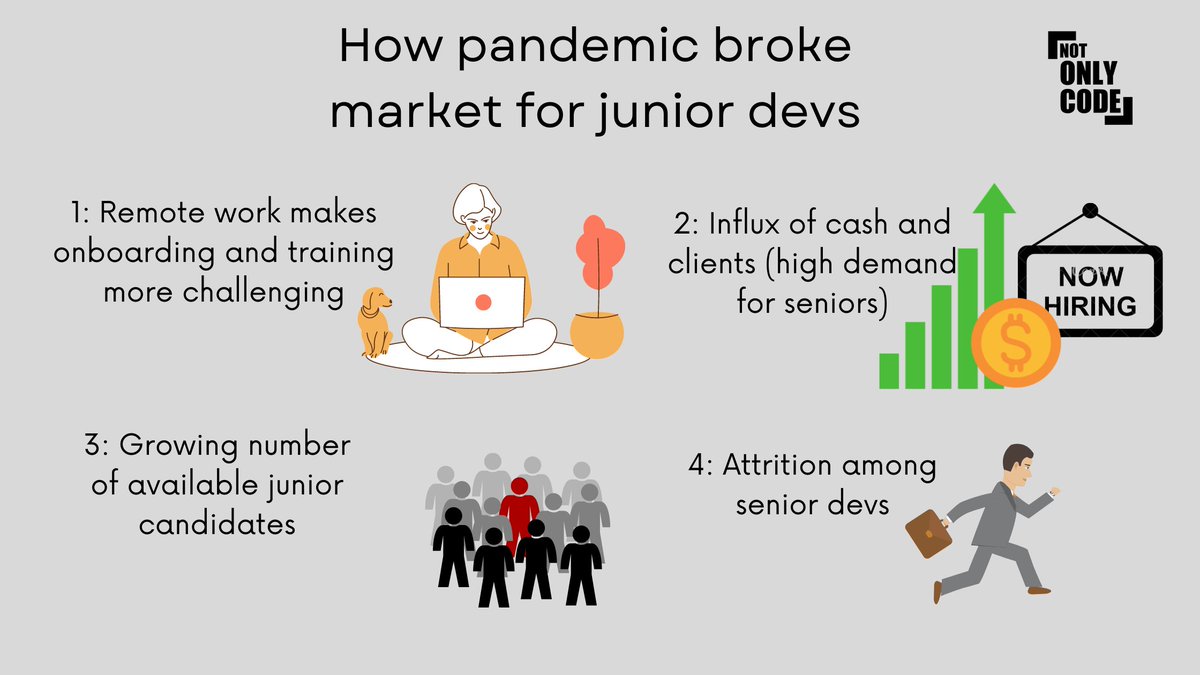
🧵The job market for junior devs is not great these days (to put it mildly), so here are a few tips from recruiters, hiring managers, and my own experience about how to get your first job as a developer:
#CodeNewbie #DEVCommunity
#CodeNewbie #DEVCommunity

1. Check multiple job boards, not only LinkedIn - junior positions are easier to fill, so there's no need for companies to advertise them everywhere, they'll get a lot of candidates anyway
2. Check out careers page of larger companies around you, and sign up for updates if they have such option. Careers page is where the job offers appear first, so be the first one to know about them
3. Don't worry about meeting all requirements in the job description, as long as you meet 50% or even 30%, give it a go. I've never met 100% requirements and I've been working in this industry for more than a decade
4. If you see mid-level job opportunity, you can reach out directly to the company and see if they're open to hiring a junior dev. Small companies are not so strict, often resumes are checked by co-founders, use that (you can move to a larger company later, it'll be much easier!)
5. Remember that all you need is just 1 offer. It doesn't matter whether you get 1 offer after 5 applications or after 500 applications, 1 job offer is all that you need in the beginning, that's your goal
6. Attend dev-related/career-related events. they'll often feel like a waste of time, but here's the thing: sometimes you'll meet people who can help you there. It might be a recruiter that'll send your resume to a company, maybe someone will suggest changes in your resume etc.
7. Which brings me to the dreaded networking - having a real professional network will have a huge impact on your career, so start early. Meet people, chat with people, follow up with people. It might not help you directly now, but it's a long-term game
8. Harsh truth: your resume is almost the same as 95% of other resumes, and that's normal. But you can tailor it to the company you're applying - send more colorful and informal version to small company, send more stiff and professional version to corpo
9. Portfolio: not many people look at these. You should build projects to gain more skills, but from hiring perspective 1 creative and polished project is worth more than 10 React applications built by following tutorials step by step
10. We're getting to some tense stuff, pay attention: finding your first job might take a long time - whether it's first job in tech, first job in a new domain, first job in a new country etc. you will have disadvantage, which means you'll need to put more effort and wait longer
11. It's easy to burn out, it's easy to get depressed, it's easy to start doubting yourself, so pay attention to your mental health. Last year my wife spend a few months looking for a new job, and every rejection hits hard, especially when you get to the later interview stages
12. Set a pace and stick to it - one day you might find 10 new job offers, and the next day 0. You should rather send 5 applications on the first day and then another 5, that way you'll be able to put more time into applications and you'll feel more productive
13. Treat finding a job as a job itself - start in the morning, spend some time finding new offers, some time reaching out to people, some time applying, have a daily rhythm that you keep Monday to Friday
14. TAKE TIME OFF. If you can, take weekends off, if you've been searching for 3 months, take a few days break. It'll be hard to stop thinking about resumes and job applications, but it'll allow you to go longer
15. I can't emphasize how helpful it it - last year I took a few days off and my wife took a break from job search. Even though we could not go anywhere, it gave us both a lot of energy and motivation
16. Last part: use free resources that are available. See whether there's a junior dev community like juniordev.io around you, check online communities, even Reddit can be useful when it's not toxic
17. Not to mention YT channels or places like @ThePracticalDev where people share their knowledge. It's easy to get swamped by all these resources, so make sure to pick one thing at a time
18. A year ago I interviewed a few recruiters and hiring managers about finding job as a junior dev. Their advice is still relevant today:
19. Finally, I provide some free advice via @ClubMentoring - I mostly talk to senior devs and engineering managers, but if you have questions about getting your first job in the industry, you can check out when I'm available: mentoring-club.com/the-mentors/gr…
20. Obligatory "this should have been a blog post". Yeah, I know, I know. /🧵
• • •
Missing some Tweet in this thread? You can try to
force a refresh









